Related Research Articles

Tunisia, officially the Republic of Tunisia, is the northernmost country in Africa. It is a part of the Maghreb region of North Africa, and is bordered by Algeria to the west and southwest, Libya to the southeast, and the Mediterranean Sea to the north and east; covering 163,610 km2 (63,170 sq mi), with a population of 11 million. It contains the eastern end of the Atlas Mountains and the northern reaches of the Sahara desert, with much of its remaining territory arable land. Its 1,300 km (810 mi) of coastline include the African conjunction of the western and eastern parts of the Mediterranean Basin. Tunisia is home to Africa's northernmost point, Cape Angela; and its capital and largest city is Tunis, located on its northeastern coast, which lends the country its name.
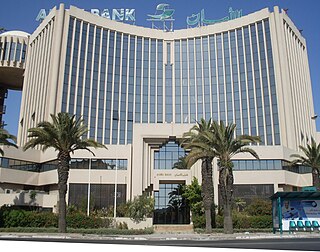
The economy of Tunisia is in the process of being liberalized after decades of heavy state direction and participation in the country's economy. Prudent economic and fiscal planning have resulted in moderate but sustained growth for over a decade. Tunisia's economic growth historically has depended on oil, phosphates, agri-food products, car parts manufacturing, and tourism. In the World Economic Forum Global Competitiveness Report for 2015–2016, Tunisia ranks in 92nd place. Based on HDI latest report, Tunisia ranks 96th globally and 5th in Africa.
Telecommunications in Tunisia includes telephones, radio, television, and the Internet. The Ministry of Communication Technologies, a cabinet-level governmental agency, is in charge of organizing the sector.
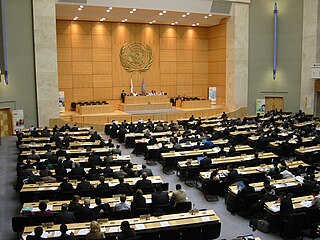
The World Summit on the Information Society (WSIS) was a two-phase United Nations-sponsored summit on information, communication and, in broad terms, the information society that took place in 2003 in Geneva and in 2005 in Tunis. One of its chief aims was to bridge the global digital divide separating rich countries from poor countries by increasing internet accessibility in the developing world. The conferences established 17 May as World Information Society Day.

Popular Unity Movement, is a socialist political party in Tunisia.
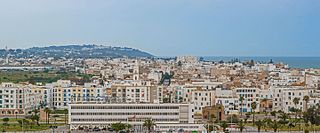
La Goulette, known in Arabic as Halq al-Wadi, is a municipality and the port of Tunis, Tunisia.
The Socialist Destourian Party was the ruling political party of Tunisia from 1964 to 1988. Bahi Ladgham was the first Prime Minister from the party and Hédi Baccouche was the last. It was founded on 22 October 1964 and disbanded on 27 February 1988. Habib Bourgiba was the first president of the Socialist Destourian Party from 1964 to 1987. He was succeeded by Zine El Abidine Ben Ali from 1987 to 1988.

The Ninth Tunisia Plan was an economic development plan implemented by the government of Tunisia from 1996 to 2001.
The Fourth Tunisia Plan was an economic development plan and realignment of foreign policy implemented by the government of President Habib Bourguiba from 1973 to 1976.
The Third Tunisia Plan was an economic development plan implemented by the government of President Habib Bourguiba from 1969 to 1972.
The Sixth Tunisia Plan was an economic development plan implemented by the government of President Habib Bourguiba from 1982 to 1986.
The Seventh Tunisia Plan was an economic development plan implemented by the government of Tunisia from 1986 to 1990.
The Second Tunisia Plan was an economic development plan implemented by the government of President Habib Bourguiba from 1965 to 1968.

Tunisia – United States relations are bilateral relations between Tunisia and the United States.

The following outline is provided as an overview of and topical guide to Tunisia:

Russia–Tunisia relations (Arabic: العلاقات التونسية الروسية) are foreign relations between Russia and Tunisia. Both countries had established diplomatic relations in 1956, when Tunisia got its independence. Russia has an embassy in Tunis, and Tunisia has an embassy in Moscow.

Tunisia has achieved the highest access rates to water supply and sanitation services among the Middle East and North Africa. As of 2011, access to safe drinking water became close to universal approaching 100% in urban areas and 90% in rural areas. Tunisia provides good quality drinking water throughout the year.

Sakiet Ezzit is a town and commune in the Sfax Governorate, Tunisia. Attached administratively to the governorate of Sfax, it is the center of a delegation counting 72 481 inhabitants in 2006 and is a municipality with 44,886 inhabitants in 2004.2 The city itself has a population of 12 613 inhabitants. As of 2004 it had a population of 44,886.
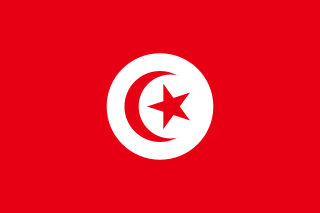
The French protectorate of Tunisia, commonly referred to as simply French Tunisia, was established in 1881, during the French colonial Empire era, and lasted until Tunisian independence in 1956.
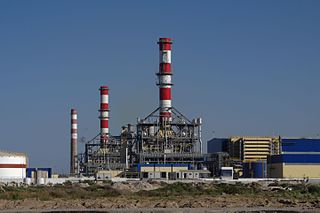
The energy sector in Tunisia includes all production, processing and, transit of energy consumption in this country. The production involves the upstream sector that includes general oil and gas, the downstream sector that includes the only refinery in Tunisia and most of the production of natural gas, and varied electrical/renewable energies. Renewable energy has been a strong point of focus for Tunisia as they look to optimize their green energy sources and advance their developing country. The Tunisian government has partnered with Russia and France in hopes of establishing nuclear energy as a viable alternative to fossil fuels and taking up a nontrivial chunk of the energy production in Tunisia. This is expected to be accomplished in the 2020's.